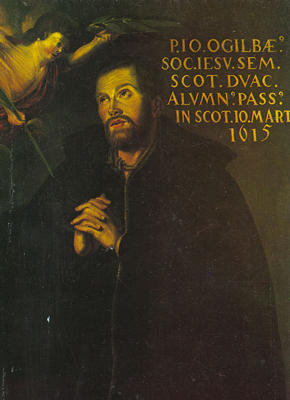
A portrait painted in the northern French town of Douai of Saint John Ogilvie, Roman Catholic martyr.
John Ogilvie claimed to be from a noble family in the North East and to have been raised as a Protestant. He was educated on the continent, converted to Roman Catholicism and was ordained as Jesuit priest at Paris in 1610. He travelled back to Scotland in 1613 disguised as a soldier, John Watson, one of three priests who returned as missionaries ut dedocerem haeresim (“to unteach heresy") in a country where the celebration of mass had been banned. However, in 1614 he was betrayed to the authorities in Glasgow, arrested and interrogated in prison there and in Edinburgh. After three trials, Ogilvie was convicted of high treason for refusing to accept the supremacy of King James in spiritual matters. He was hanged at Glasgow Cross on 10 March 1615.
In 1967, John Fagan, a former docker living in Easterhouse (the only parish in the world named after the martyr Ogilvie) made a remarkable recovery from stomach cancer. Claims were made for the miraculous intervention of John Ogilive and these were accepted by the Roman Catholic authorities after a lengthy investigation. In 1976, at a ceremony in Rome attended by over 4,000 people from Scotland, John Ogilvie was canonised by Pope Paul VI and became Scotland's first saint for over 700 years.
Reference: Mitchell Library, G 282.0924 OGI/QUI
Reproduced with the permission of Glasgow City Council, Libraries Information and Learning
Keywords:
cancer patients, canonisations, dockers, executions, hangings, Jesuits, martyrs, miracles, priests, prisoners, Roman Catholic Church, saints, Society of Jesus, traitors, treason
You have 0 images in your photo album.